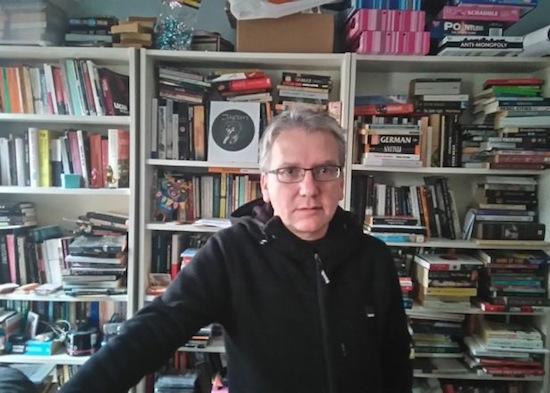There is a fog of dead voices descending. I can hear the sound of crackle, of static memory. There’s an old gramophone record playing somewhere but it is fading slowly away. I am standing in the centre of The Caretaker’s latest release – "Take care. It’s a desert out there…" in memory of and for Mark Fisher. Standing? Not ‘sat listening to’? It’s vital to make the point that, like all records by James Leyland Kirby, there is a sense of enveloping that suggests spatial qualities within the music. The records become places, sometimes overtly specific in character but on other occasions transporting the listener into a void of sorts. This is highly appropriate considering the main essence of this particular collection of previously unreleased material. Dedicated to the theorist and writer, Mark Fisher, who took his own life in January 2017 after suffering from severe depression, the feeling of a hopeless void frames everything that is heard.
Kirby’s work has long been symbiotic with Fisher’s ideas. His music had been of interest to the theorist, discussed in his collected essays, Ghosts Of My Life (2014), as well as numerous pieces online. From the title alone, it’s clear Kirby adept with Fisher’s theories. Due to its sense of shifting perspective, the word "memory" is treated with appropriate precaution in the record’s title. The album is not simply in memory "of" but "for" too. What does this mean, or what could it mean? Memory is key to Fisher’s work, the pivot upon which a number of his ideas turn. Is this music, therefore, a memory-scape of Fisher? It could be the memory of a future now lost through his suicide as well as simultaneously "in memory of", of course. Such questions are subtly raised from the very outset.
There’s a cascading effect as each potential angle of perception opens up possibilities. This is reflected in the music, as if all potentials have happened simultaneously and have created the haze; rather like those popular images of the frames from a single film all condensed into one image. The strict meaning is lost and yet there is still something communicable there at its core even if it is obscured. Take care, itself a reversal of Kirby’s stage-name – moving his position from manual job to concerned instruction – is a work denying clear visions of its core because it is beyond representation; loss via a too-soon, unexpected death. Appropriately the title of Burial’s last release before Fisher’s suicide, another of the writer’s musical ghosts in the machine, was Young Death; clawing back from the precipice of our post-capitalist nausea. Time is difficult to perceive within Kirby’s record as looking back gives no indicator of distance. Sometimes there are tonal progressions, subtle enough to make it less a movement and more an evolution. The sounds overlap to the point where it’s easy to forget how the last element began or even what it consisted of.
It feels almost weather-like which is appropriate as depression is in some sense meteorological.
Everything is dampened, nothing is spared. There is only the "now" when the weather is bad. Bones are damp, thoughts are damp and the dry land that others inhabit is seemingly inconceivable. Jonathan Miller once quoted a letter of William James in an interview with Dick Cavett where James wrote that "…the best way to get around depression is to understand that the moods of the mind, including these great black moods, are like the weather and one simply has to take shelter until the clouds begin to part again." On an aesthetic level, The Caretaker’s music understands this ideal. Though in one sense James is right, especially as to the very feeling of a depressive spell descending. Fisher’s own arguments about depression were less passive than this assertion. He saw the illness was aided by a more solid and tangible aggregator that could in some sense be fought and questioned: post-capitalism.
In a talk on the very subject of depression and cybernetics in 2013, Fisher suggested with a frustrated, anger-tinged voice that "The increase in depression [in young people] is shocking and that ought to be the biggest indicator and condemnation of the world in which we now live in." There is something tangible to be done, to combat this increase and yet we know that striving against such huge systems is incredibly difficult when under the mental strain that being within them causes. This is the desert of the record, a seeming void where our constant stress is demanded to continue productivity, to work ourselves to a better future that simply cannot come. Fisher’s vision, and perhaps our reality today, is a binary of collapses: the economic option, continuing on like a zombie in spite of its obvious and dramatic failings, or the mental option where the pressure expounded by the economic model causes wide-scale mental health issues.
Yet I can’t help feeling a sense of quiet optimism in the melded fragments of Kirby’s record. Somewhere, a tonality moves to a major key, there is still life somewhere. No matter what the textural aesthetics are telling us, the position it is coming from – the fog of dead voices, the crackle of the analogue era when futures weren’t entirely lost – still maintains that something remains. The melodies of Take care are questioning in nature, a "What if?" in a haze of almost engulfing hopelessness. But as long as the questioning remains, so does a slight glimmer that the system around us will eventually give way, that it won’t stumble on somehow still further than it already has post-2008 and certainly post-2016. What was once simply withered has now turned rotten. There is moss growing in small patches, on the stones that mark the decaying remnants of what we once were, from the time when we had a future. But all is not yet lost.



